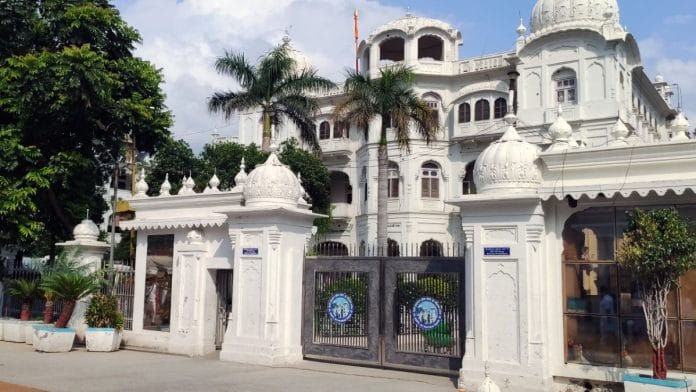New Delhi: Although Sikhism explicitly rejects caste, in theory, caste-based discrimination continues to persist within the Sikh community and its practices, according to Surinder S. Jodhka, professor of Sociology at the Jawaharlal Nehru University (JNU).
Recent controversies, including the resignation and reinstatement of Giani Harpreet Singh, a Dalit Sikh, as acting jathedar of the Akal Takht, amid allegations of casteist remarks against him, further illustrate how caste continues to shape political identities in Punjab.
In the paper published in the Multidisciplinary Digital Publishing Institute (MDPI) on 8 October, Jodhka examines the challenges Sikh institutions and individuals face in reconciling these contradictions while advocating for reform and inclusivity. Titled ‘Sikh Religion and Contentions around Caste,’ the paper also explores the tension between Sikhism’s foundational principles of equality and the presence of caste-based hierarchies.
In the paper, he challenges the dominant narrative which “sees it [caste] as a purely religious practice” and argues for the “need to look at the materiality of caste”.
The paper was published as part of a special issue—Sikhi, Sikhs and Caste: Lived Experiences in a Global Context—by MDPI, which publishes over 390 open access journals.
Jodhka writes that the ‘obvious’ response of Sikh leaders and scholars to the issue of persistence of caste in Sikhism, that it is a matter of how ‘practice’ is not aligned with ‘theory’, is “a simplistic response”. This response, he writes, “does not permit us to engage with its diverse empirics among the Sikhs and its other contextual dynamics”.
Sikhism, writes Jodhka, was founded on principles of equality, explicitly rejecting the caste system and hierarchies prevalent in Hindu society at the time.
He adds that by promoting the elimination of caste distinctions, Sikhism encourages its followers to create an inclusive society where all individuals are treated with respect and compassion, regardless of their social background. “Unlike the Hindu temples, Sikh Gurudwaras are open to all, and no one is prohibited from joining the religious congregation. There are rich and poor among the Sikhs, but there is no ritual hierarchy. Sikhs do not have a priestly class, like the Brahmins in Hinduism,” reads the paper.
Also Read: As sehajdharis push for voting rights in SGPC polls, a look at Sikh subgroups & issues around them
Persistence of caste practices
There is a significant divide between Jat Sikhs and Dalit Sikhs (Mazhabi Sikhs), with Jat Sikhs often holding dominant positions in religious and social institutions, perpetuating systemic discrimination, writes Jodhka.
This contradiction between Sikh philosophy and the realities of caste dynamics illustrates the challenges faced by Sikhs in fully realizing their faith’s egalitarian ideals.
Jodhka traces Sikhism’s historical trajectory, noting that the structures intended to eradicate caste inequalities have sometimes reflected them.
He writes that the formation of Khalsa in 1699 by Guru Gobind Singh, aimed at creating a distinct Sikh identity, inadvertently laid the groundwork for new hierarchies.
However, Jodhka stresses that despite the theological framework, caste continues to influence various aspects of Sikh life, including marriage, social interactions, and religious practices. Marriage practices often reflect caste considerations, with individuals seeking partners from their own caste group, undermining Sikh principles of equality.
Caste also impacts social interactions and religious practices, such as seating arrangements during communal meals and leadership roles in religious institutions, often dominated by specific caste groups, he adds. Sikh institutions, particularly Gurudwaras, are meant to be spaces of equality, but caste identities often infiltrate these sacred spaces. Jodhka writes that leadership roles within Sikh institutions too sometimes prioritise caste over merit.
Political dimension
The paper then goes on to discuss how caste identities shape political power and representation in Punjab. Jat Sikhs, a dominant agrarian community, wield significant economic power, which translates into substantial political influence. On the other hand are Dalit Sikhs, who having historically faced marginalization, mobilized through various movements to advocate for their rights and seek greater political representation.
The dominance of Jat Sikhs in political leadership positions is evident, given that all of Punjab’s 13 chief ministers since 1966 have been from the Jat Sikh community, with only two exceptions: Giani Zail Singh (1972-77) and Charanjit Singh Channi (2021-22).
Quest for reform
Jodhka discusses how caste remains a widely discussed yet marginal topic within Sikh society. Many Sikhs tend to deny the active presence of caste due to the internal conflict between Sikhism’s opposition to caste and the lived realities of caste dynamics.
Simplistic solutions, such as aligning Sikh practices with religious teachings, fail to address the complexities of caste as a social construct shaped by regional and historical contexts, he writes. He goes on to add that colonial and orientalist narratives have framed caste as primarily a Hindu phenomenon, but scholars argue that caste practices in Sikh communities are shaped by regional histories and local power dynamics.
While Sikh Gurus opposed caste, modern ideals of equality pose challenges to creating a future free from caste-based violence and hierarchies, making the quest for a truly egalitarian society an ongoing struggle.
Vartika Singh is an intern with ThePrint
Also Read: Want to understand Punjab’s history? Look to farmers and peasants, not Gurus






